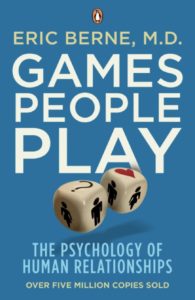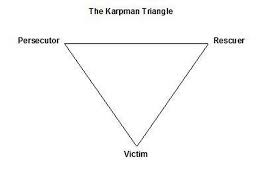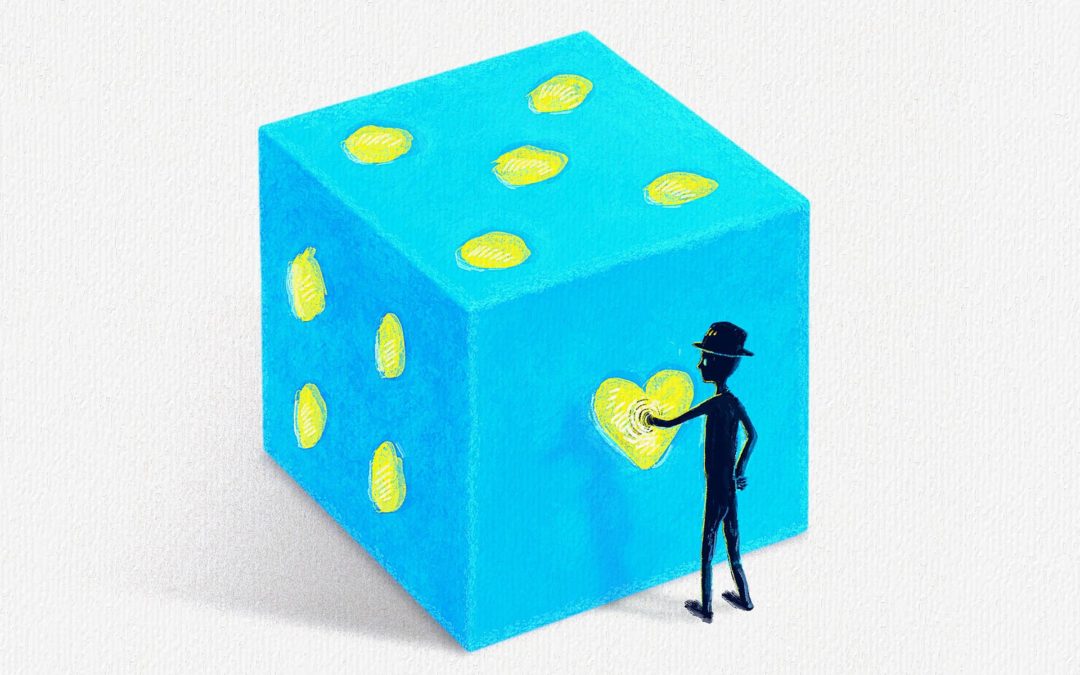 Based on the concept of Transactional Analysis devised by Eric Berne in the 1960’s and outlined in his book Games People Play, this therapeutic approach looks at human interaction in terms of parent, adult, child states. In this book Berne suggests that we play games to get our needs for attention met, when we are unable to get them met in an authentic and straightforward manner.
Based on the concept of Transactional Analysis devised by Eric Berne in the 1960’s and outlined in his book Games People Play, this therapeutic approach looks at human interaction in terms of parent, adult, child states. In this book Berne suggests that we play games to get our needs for attention met, when we are unable to get them met in an authentic and straightforward manner.
Games People Play identified over 30 games but some of the most popular and descriptive ones are
- Addict
- Alcoholic
- Ain’t it Awful
- Blemish
- Debtor
- Kick me
- If it weren’t for you
- I was only trying to help you
- Look how hard I’ve tried
- Now I’ve got you son of a bitch
- See what you made me do
- Why don’t you – yes, but
- Wooden leg
All of us play games at some level. Each of the games involves the players taking up a starting position of persecutor, rescuer or victim. Berne suggested that everyone who plays a game will switch to every other position in the game so that the person playing victim in one round will eventually play rescuer or then persecutor in later rounds.
Games are played outside of our awareness. It is almost as though we are wearing an invisible ‘T’ shirt with persecutor, rescuer or victim on it. This slogan can be subconsciously read by others and lets them know our preferred start position and enables us to find the player who will take on the corresponding role in our game without us realising that we are doing this.
The definition of a persecutor is someone who seems like a critical or controlling parent – An aggressor who acts out the unconscious slogan ‘I can make you feel bad’
The definition of a rescuer is someone who seems like a nurturing parent – An apparently nice and helpful person, who acts out the unconscious slogan ‘I can make you feel good’
A person is rescuing when he or she is
- Doing something they don’t want to do
- Doing something they have not been asked to do
- Is doing more than 50% of the work
- Is not asking for what he/she wants
The definition of a victim is someone who seems like a helpless or adapted child – An apparently hopeless and powerless person who gives his or her power to others, who acts out the unconscious slogan ‘you can make me feel good or bad’
Both Persecutor and Rescuer positions are played from the ‘one up’, or ‘I am positive, you are negative’ position.
The victim position is played from the ‘one down’ or ‘I negative, you positive’ position.
The basic structure of a game is
- Identification of a victim (either for the persecutor or the rescuer)
- A hook (a way of hooking the unsuspecting mark)
- A switch (when one of the game players – victim, persecutor or rescuer changes the direction of the transaction)
- Confusion – when the players can’t understand how they got to this position and have an ‘old familiar feeling that they have been there before’
- Return to original position – all parties feel uncomfortable in the switch position and move back to original positions where the game starts again.
All of us play games and all of us play from a preferred starting position. Games can be fairly innocuous or for people with a tendency to play more dangerous games can escalate into murder or warfare.
 In 1968 Stephen Karpman further developed the concept of game theory in an article called ‘Script Drama Analysis’ by introducing the idea of the Drama Triangle. In this article Karpman published a simple and illuminating diagram to illustrate how games unfold. From time to time I send this model to clients to help them understand and disengage from the dynamics of difficult and repeating situations they may find themselves in. I particularly like this model because you do not have to understand a great deal about transactional analysis to understand the behaviour it is describing. It seems to have an innate wisdom about it that most people seem to grasp straightaway.
In 1968 Stephen Karpman further developed the concept of game theory in an article called ‘Script Drama Analysis’ by introducing the idea of the Drama Triangle. In this article Karpman published a simple and illuminating diagram to illustrate how games unfold. From time to time I send this model to clients to help them understand and disengage from the dynamics of difficult and repeating situations they may find themselves in. I particularly like this model because you do not have to understand a great deal about transactional analysis to understand the behaviour it is describing. It seems to have an innate wisdom about it that most people seem to grasp straightaway.
The Karpman’s Drama Triangle diagrama illustrates a triangle with Persecutor, Victim and Rescuer at each of the corners. When the game is in progress a victim can move to persecutor and and a rescuer can move to persecutor then back to their original places. The shifts in position, occur when the games are being played.
Transactional Analysis itself is a complete study of human behaviour which can be very useful to help interpret our own actions and the actions of others. However I have found that when I explain the drama triangle to my clients they intuitively seem to understand the underlying principle behind the approach and can use it to make different choices about their behaviour.
The drama triangle – practical examples
Here is example, which starts from the persecutor position. A person who is persecuting picks an adult or child who has a tendency to act like a victim and niggles them and niggles them in very low key and subtle ways (the hook) until the victim has had enough and very obviously turns into a persecutor (switch). The persecutor then acts like a victim (switch) and invites sympathy from third parties and looks gloatingly at the previous victim implying ‘Now I’ve got you son of a bitch’. Very soon both parties will move back into their preferred role and if nothing changes the game will start again.
I once worked in a department where the secretary controlled the department. You could not get a paper clip without having her permission. She also took it in turns to persecute people in the department and to my shame I did not defend colleagues when they were in her trajectory. Nor did they defend me when it was my time to play victim in the game. What she did was to do small criticisms which none of us challenged until one day the cumulative effect of insults and put downs became too much and we when it was our turn to be in the game, exploded – moving from victim to persucutor. When the boss asked us what was the problem all of the reasons for our eruptions, sounded so trivial that we looked stupid. This left the secretary able to look at us as if to say ‘see what I have to put up with they just get angry over nothing’ – moving from persecutor to victim.
A few days later the game would usually start again but this time involving someone else. It was as if we were continually acting out the game ‘now I have got you, you son of a bitch’.
The effect of this situation was that the department was in constant drama with mature adults walking on egg shells and reduced to the status of quivering wrecks. At this point I came across the concept of the drama triangle. When I moved into an observer position I could see the game unfold. I began to spot the ‘hooks’ and know when my personal buttons where being pressed. Although it took a considerable amount of self-control, I learnt not to react when provoked. On one occasion I even remember sitting on my hands and counting to ten to avoid getting caught up in the game. What was fascinating for me after this event was that the other members of the department also learnt to disengage from the dynamic with the result that the secretary became a much more equal and involved member of the team.
I hope that the simple example, from my own experience will assist you to understand the drama triangle as it is played out.
Here is another example.
I can do CV’s for people and used to enjoy offering to do them for people without them asking (rescuing). I used to sell the idea to them (the hook) and then put a lot of work into them. When I completed and sent them to people, sometimes I did not hear from them, even a thank you. I would then often find out that they had used them to significantly improve their salary or get a better job.
I began to feel very resentful (the switch) to those people and criticised their lack of consideration (victim). If I had raised it with them it is possible that they would have tried to rescue me by apologising and trying to make me feel better. In this instance I would be playing ‘look how hard I’ve tried’ or if they had persecuted me and I would be playing ‘I was only trying to help you’.
Alternatively I could have moved positions to persecutor and play the ‘After all I have done for you’ card
Rather than move back into the rescuer position, in fact I learnt not to rescue in future with regard to CV’s and stepped off the triangle.
Games create chaos, conflict, excitement and of course drama. They also serve to reinforce negative life positions or scripts and you see how they fit in with the negative thoughts processes that we covered in the chapter on Changing Negative Beliefs.
An effective step by step approach to stepping out of the drama triangle is outlined in the People Skills Revolution Handbook which was published on the 15th April 2013 and is available from Amazon.

